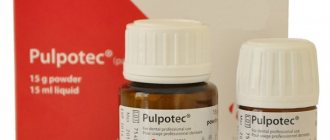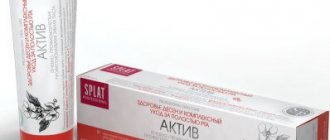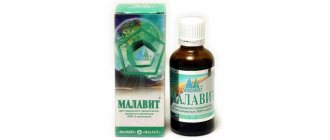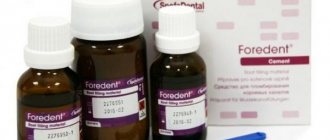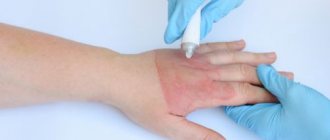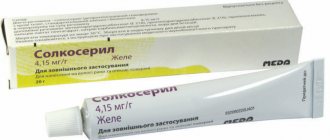2770
Among the variety of dental preparations, I often want to understand in more detail the differences and practical purposes of each, especially when there are many analogues.
The goal of a self-respecting dentist is to choose the most effective, appropriate composition for a specific situation.
Among the latest developments among materials for temporary filling of dental canals, Metapaste deserves special attention.
General overview
The drug is available in the form of a white paste, which has a medium consistency and is easily introduced into the cavity.
The substance is packaged in plastic syringes and is completely ready for use for filling. This product is produced in Korea.
When exposed, a bactericidal treatment is carried out, since the active components come into contact with the microflora of the oral cavity and completely destroy pathogenic microorganisms.
The effect begins 5 minutes after administration, and after 48 hours the treated cavity becomes completely sterile.
The kit, in addition to a syringe for 2.2 grams of the substance , includes plastic tips, each of which is intended for single use. Also included in the package is a ring with a rotating design , which allows you to adjust the direction of the tip when fixing it.
With the help of such a system, the introduction of paste into the tissues located around the tooth apex is made as quick and simple as possible; if necessary, the material can be removed.
One package allows you to fill up to 75 tooth canals with paste that require treatment for infection. The composition includes the following components:
- Calcium hydroxide.
- Barium sulfate.
How to eliminate pain?
While the temporary filling is in place, it is important to follow all medical recommendations. To relieve unpleasant symptoms, a specialist may recommend combined analgesics or drugs with paracetamol and ibuprofen (Panadol, Efferalgan, Ibufen, Nise, etc.).
Rinsing with a soda solution will help soothe the tooth. Often, alcohol tinctures, which have a pronounced antiseptic effect, are used for this purpose.
You can cope with pain using traditional medicine:
- Aloe applications. A cut fresh leaf of the plant is applied to the sore spot.
- Applications from herbal tinctures. You can buy a tincture of calendula, mint or valerian at the pharmacy, then soak a bandage or cotton wool in it and apply it to the tooth.
- Lotions made from propolis tincture (2%). Keep the swab soaked in the medicine on the tooth for several minutes. You can also prepare a rinse solution by adding 3 tsp to a glass of warm boiled water. alcohol solution.
- Rinse solution made from chamomile infusion. Pour a glass of boiling water over the dry herb (2 tbsp) and leave for about half an hour. Rinse your mouth with the resulting decoction 3 times a day.
You can eliminate toothache by lubricating your gums with clove essential oil or placing a piece of unsalted lard on the sore tooth. Massaging your earlobes will also help you forget that your tooth hurts. It is enough to massage the earlobe for 5 minutes.
Composition and equipment
The filling substance Metapaste contains calcium hydroxide and barium sulfate with high radiopacity. The drug is packaged as follows:
- syringes with paste, the amount of which in each is 2.2 g;
- special tips for single use;
- a rotating ring that controls the direction of the tip.
Plastic syringes with cannulas are intended for one-time use; they repeat the shape of the canals one to one. They are fairly easy to inject into the tissue around the apex. If necessary, the paste can be easily removed. One package of the drug is enough to treat 75 canals susceptible to infection.
Therapeutic effect
Metapaste acts as a therapeutic pad during the treatment of deep caries.
With the help of this component, it is possible to completely disinfect all root canals, and in case of periodontitis, it is possible to form a protective barrier of hard tissue in the area of resorption. Thus, the root canals are reliably and effectively isolated from infected tissue after closure of the lumen.
This treatment method always leads to positive histological results. Due to the high pH values, a lasting antibacterial effect is ensured.
The filling component reliably protects against the penetration of bacteria, isolates sensitive dental tissue, and prevents destruction.
Advantages
The presented material for filling fillings has a considerable list of advantages and, when compared with other compositions, it is characteristic:
- The penetration rate of X-rays is high, and insoluble silicone is used to prepare the paste itself. As a result, the composition can also be used to install permanent fillings.
- Due to the fact that the composition is immediately filled with a syringe, it is easily inserted into the tooth root canal, and due to the disposable attachments, there is no risk of infection, which reduces or eliminates the need for repeated dental intervention.
- It has an odontotropic and antibacterial effect - this allows you to achieve a lasting, positive therapeutic effect.
- It does not disturb the pH level - its indicators correspond to a level of 12.5 units and due to this, the drug acts as a mild and effective local antibiotic, suppressing the growth and development of pathogenic microflora in the oral cavity.
In addition, the composition completely eliminates re-infection and inflammation of the canal, even in a patient with severe pathologies and complications.
Why is medicine placed under the filling, and how long do you need to walk with it?
To remove the nerve, an arsenic-based medicine is placed into the tooth cavity, which promotes necrotization of the pulp. Modern products may also contain an antiseptic. In all other cases, preparations with calcium hydroxide are used. The medicine disinfects the tooth cavity and accelerates metabolic processes in periodontal tissues. When a filling is placed, a dental unit can normally hurt for about 2 weeks.
Most often, arsenic is used in the treatment of pulpitis (we recommend reading: how to remove arsenic from a tooth at home?). The medicinal paste leads to necrosis of blood vessels and nerves. When all nerve endings are removed, the risk of complications is minimal. In addition, the tooth will lose sensitivity, so all further manipulations by the doctor will be painless for the patient.
For pulpitis, different types of medicinal pastes are used depending on their duration of action. The desired effect can be achieved in a few days, sometimes treatment takes up to 2 weeks. The doctor will tell you exactly how long to keep the medicine. If the medicine remains in the tooth cavity for too long, it will lead to necrosis of the periodontal and hard dental tissues.
When the nerve is removed, the doctor often re-installs a temporary filling after placing an anti-inflammatory drug into the hole. In this case, it is recommended to come for an appointment after 7 days. The medicine will not cause any harm to the patient’s health, even if you walk with it for 2-3 weeks.
Treatment of periodontitis requires a special approach. This disease cannot be cured in one go. Depending on the severity of the pathology, the doctor determines which medicine can relieve inflammation and how long the patient will have to walk with a temporary filling.
To save a tooth, it is necessary to restore the bone tissue. Assessing the current condition of the dental unit, the specialist replaces one temporary filling with another.
Paste properties
The manufacturer reports that Vitapex resorption approaches that of the root. The material is a soft, pre-mixed paste.
The paste is placed into the root and apical area with a plastic syringe and special tips. According to the manufacturer, the material is chemically and physically stable, has high radiopacity and excellent antibacterial and bacteriostatic properties.
Twenty-six professionals evaluated Vitapex in 200 clinical situations. This material received a rating of 92%.
The paste can be used as a temporary or permanent root canal filling material after pulpectomy.
In addition, Vitapex:
- disinfects channels;
- stimulates apexification;
- neutralizes endotoxins;
- stimulates the formation of hard tissues.
Calcium hydroxide is believed to have an antimicrobial effect and is easily absorbed if it gets beyond the apex of the tooth.
This is interesting: Treatment of deep dental caries - pain relief and diagnosis
The antimicrobial effect of calcium hydroxide is associated with its ionic dissociation into Ca2 + and OH- ions.
Vitapex/vitapex Preparation for filling root canals
The preparation for filling root canals Vitapex today is produced completely ready for use, representing a material packaged in a syringe used to inject the paste directly into the prepared canals. Due to this, the paste remains sterile during transportation and storage, providing a high level of convenience for the attending physician. Today, purchasing the drug Vitapex is the right and optimal solution, both for its independent use and in the case of combination with polypropylene pins such as Flex Point Neo, since the product is not capable of staining tooth tissue, promoting the resorption of granuloma during use.
The active components of Vitapex are intended to be used:
— silicone oil (22.4%), which, due to its hydrophobic properties, is capable of providing adequate isolation of root canals; — iodoform (40.4%), which has a powerful antibacterial effect; — calcium hydroxide (30.3%), providing osteoinductivity and a high level of radiopacity; — other components, the share of which is 6.9%.
After hardening, the drug can remain in a stable state for several years.
Vitapex provides effective antibacterial and bone-stimulating effects. And the presence of such a component as calcium hydroxide in its composition allows for the widespread use of Vitapex during dental treatment in children, filling the root canals of permanent teeth in which root formation has not yet completed. When filling baby teeth, the drug is absorbed at the same rate as resorption of the root of the filled tooth occurs. And after several years after treatment, this material shows no changes - both chemical and physical characteristics.
The main advantage of using Vitapex today is considered to be its powerful antibacterial effect, since after its use there is continuous bacteriostasis, which can ensure the cessation of growth of at least 80% of the population of anaerobic bacteria such as Streptococcus mutants and Lactobacillus casei, as well as the causative agent of purulent-inflammatory lesions Staphylococcus aureus.
The drug Vitapex does not require:
— calibration of the apical foramen, as well as the cone of the root canal; — endo-sealant, which provides three-dimensional obturation of the canal; — availability of expensive devices; - heating, as a result of which the possibility of getting a burn to the periapical tissues due to hot gutta-percha is completely excluded.
By purchasing this material, you will be able to save time, since the time savings with VITAPEX reaches 10 minutes when comparing the drug with lateral condensation or gutta-percha.
The effect of arsenic on a tooth after the canals have been cleaned and the medicine has been applied.
A dangerous dose of arsenic for humans is considered to be 5–15 milligrams. However, dentists do not use pure arsenic, but a paste. It includes:
- anhydride ;
- anesthetic (usually Lidocaine or Novocaine);
- a drug with an antiseptic effect (Thymol, carbolic acid or Camphor);
- a substance that inhibits penetration into the pulp (Tannin);
- filler to give it a spherical shape.
Before placing arsenic on the tooth, the cavity is cleaned and carious tissue and dentin are removed. After these measures are completed, arsenic paste is applied Under the influence of the drug, nerve cells die, blood stops feeding the pulp, and the supply of impulses to the nerve endings stops .
Important! All these processes should calm the toothache (but this does not mean that treatment can be interrupted at this point). After a temporary filling has been installed, the tooth may still hurt for some time.
They put a drug on to kill the nerve, but it hurts
After arsenic is placed in the canal, the pain should go away, since the paste contains an anesthetic .
But sometimes the tooth continues to hurt, sometimes even worse than before. This happens for several reasons:
- insufficient dose of arsenic;
- long-term wearing of a filling;
- inflammation of periodontal tissues;
- necrosis ;
- intolerable substances included in the filling;
- incorrect installation of the seal.
The dentist determines how much medication to put into the filling in relation to each client individually . And if the dose is too small, the nerve will not be killed, and it will continue to bother. In some cases, the pain goes away only on day 3 (if arsenic slowly penetrates the pulp).
Important! Pain may also indicate that the installed filling is putting pressure on the pulp. Therefore, if a tooth hurts for more than three hours, you can return to the dentist to reinstall the filling under less pressure.
Why does it hurt when pressed after cleaning the canals?
One of the common misconceptions of patients is that after cleaning the canals, the tooth cannot hurt. There is some truth in this, but it is not so simple. The nerve fibers exit through the superior opening in the root and unite into thicker trunks .
One of these trunks may be responsible for the sensitivity of the entire half of the face. This explains the pain passing through the entire nerve if the inflammation affects only one tooth.
When a nerve is removed, it is only separated from the common trunk, thereby causing inevitable tissue damage.
Canal cleaning is carried out under anesthesia, which does not allow the patient to feel when the instrument passes through the tooth. If you do not pay due attention to this procedure, a hematoma may occur at the root apex. It will cause pain when pressed.
Mild discomfort is allowed for no more than two days . If the doctor did everything correctly and carefully processed the canals, leaving lint and antiseptic in them, then there should be no problems. If, after some period of time, after treatment, the patient notices severe pain, repeated cleaning of the root canals is required. The procedure must be carried out as quickly as possible; the pain cannot be tolerated or muffled with the help of medications.
Also, one of the reasons for pain when pressing is a crack in the tooth. The incisor becomes more sensitive, especially when chewing solid food.
Pain when touched may occur in patients who have recently had crowns placed. Since in the process of grinding a tooth to fit the shape of a crown, the doctor may accidentally provoke an inflammatory process in the nerve.
Important! Nerve damage can also occur during treatment. If a tooth hurts when pressed under a filling, then this is one of the signs of periodontitis. The disease may appear due to wearing old crowns that have long been due for replacement.
Feeling of fullness and swelling of the gums
Such symptoms fit the description of periodontitis (inflammation of the upper root tissues). The disease can be asymptomatic for a long time, only sudden intervention provokes pain. A cyst or granuloma may form on the tooth root.
Indications and contraindications for use
In dentistry, Metapaste is used in a large number of cases, the main ones being the following:
- with moderate caries, the original dentinal structure is restored;
- in case of deep caries and pulpotomy, pulp covering is carried out;
- for destructive periodontitis with subsequent apexification;
- for fractures, perforation of dental roots;
- to restore deformed periodontal lining;
- formation of a form of secondary dentin in the form of a barrier of hard tissue;
- temporary filling of infected canals.
In most cases, the use of the drug is well tolerated and there are no complaints from patients. But in some cases, when there is hypersensitivity to barium sulfate, the component is not recommended.
It is forbidden to use the paste after its expiration date.
Advantages and disadvantages
The advantages of the product include the following properties:
- Excellent X-ray absorption performance.
- Rapid manifestation of the antibacterial effect . Within 5 minutes the substances begin to act and kill harmful microorganisms.
- Convenient release form , the paste is ready for application immediately, without any specific preparation.
- The syringe allows you to quickly and easily introduce the paste into the root canal , and just as quickly and easily remove the substance.
- The kit includes disposable plastic tips , which eliminates the risk of transferring infection from one dental canal to another.
- High degree of odontotropy , due to which the use of Metapaste promotes the rapid formation of secondary dentin and the remineralization process in the area of the damaged primary layer.
- Availability . Metapaste can be found in most modern pharmacies.
No disadvantages have been identified, with the exception of the risk of allergies in the patient and the need to observe certain safety measures.
"Metapex" in dentistry
"Metapex" is a filling material based on calcium hydroxide with iodoform. Used for filling root canals.
It is distinguished by its antibacterial effect, reliable adhesion to the bone tissues of the tooth, contrast in X-ray examination and ease of use. Supplied in closed syringes of 2.2 grams.
The mixture contains silicone oils, thanks to which it dissolves slowly.
Main advantages of the drug
"Metapex" has a long-lasting bactericidal effect, which is achieved due to pH 12.5. 48 hours after administration of the drug, up to 99% of microorganisms located in the root canal die.
The antibacterial component - iodoform - destroys Gram-positive pathogens, staphylococci, streptococci, fungi and viruses.
It eliminates the appearance of secondary inflammation even with complications in the form of cysts of various origins.
The paste-like consistency ensures convenient administration of the drug without prior mixing. The substance is packaged in a syringe with a sealed cap that protects Metapex from contact with air. The kit includes disposable cannulas for insertion.
The substance contains radiopaque components, due to which the sealed canals are visible in the corresponding study.
"Metapex" is safe for the soft tissues of the body, so it can be injected into leaky canals and during apexification.
You can purchase Metapex in the catalog of the Stommarket online store (follow the link).
Characteristics and scope of use of "Metapex"
"Metapex" can be used for permanent and temporary filling of root canals. However, practicing dentists recommend using it exclusively for temporary restorations. The drug itself is easy to remove and wash out, but over time its adhesion to bone tissue increases, so after prolonged (from 1 month) wearing it can be difficult to remove.
The drug is used for filling root canals with complications such as:
- Pulpotomy;
- Accidental opening of the pulp;
- Leaks;
- The need to create a barrier of dense tissue caused by ossification, perforation or resorption;
- Unformed apex on baby teeth;
- Apexification;
- Infection, the appearance of microbial infiltrate.
The main indication for using Metapex as a permanent filling material is infection of the canal. Antimicrobial properties provide long-lasting antibiotic action.
The drug causes the formation of replacement dentin, and also stimulates the remineralization of tooth bone tissue when they are weakened. The odontotropic effect is due to the presence of calcium compounds in the composition.
Some clinical cases of using Metapex
"Metapex" is recommended for temporary filling of root canals. Although it can be used for permanent wear in some cases, it is not considered suitable for this purpose by dental practitioners. However, the composition based on calcium compounds and silicone oils ensures stability while in the root canal - it does not dissolve.
Thus, “Metapex” is best used as a means for temporary canal filling if antiseptic treatment of tooth tissue is necessary. The drug is also suitable for sealing in the treatment of various diseases. After positive dynamics appear, it is recommended to replace it with another silar.
For permanent and temporary root canal filling, Metapex is applied as follows:
- It is necessary to treat the root canal;
- Then dry it with paper points;
- Insert the tip of the syringe with the drug into the canal;
- Fill the channel;
- Remove excess with a cotton ball.
The cannula tips for the syringe are disposable. The set includes 20 pieces. The cannulas are equipped with a cap for hermetically sealed closure.
The drug cannot be stored in an open syringe, since when exposed to air it loses its antimicrobial properties and begins to harden.
The drug, like other silars, cannot be taken beyond the apex.
In what cases should you immediately consult a dentist?
Slight pain when pressing on the crown of the tooth may persist for several days, so you should not pay attention to it. If the pain intensifies, the body temperature rises, the gums are swollen, you should immediately consult a doctor (we recommend reading: what to do at home if your gums are swollen and your tooth hurts?). All these symptoms indicate the development of an inflammatory process occurring in the canals of the tooth and the surrounding soft tissues.
There is no need to delay a visit to the dentist if there is an unpleasant odor coming from the mouth, and severe pain is felt when chewing and swallowing food. Weakness and malaise symbolize the development of complications, and the body spends all its strength fighting the infection.
Instructions for use Metapaste
- Once the root canal preparation is complete, clean and dry it.
- Install the disposable tip onto the syringe, as well as the included ring for easy redirection of the tip.
- Insert the tip into the root canal.
- Fill the channel completely by pressing down on the syringe plunger while slowly withdrawing the tip.
- Remove excess paste using a sterile cotton ball.
- Remove the used tip, attach a new one and put the cap on it.
Advantages
- Easy cleaning and removal
- Excellent antibacterial effect and radioopacity
- Ready-made paste in an easy-to-use syringe
- Easily penetrates the root canal, which prevents re-infection as a result of repeated manipulations
- Soluble in water
Precautionary measures
- Do not enter past the apex.
- Use only in dentistry.
- Do not use in the treatment of patients with hypersensitivity to barium sulfate.
- Avoid direct exposure to sunlight.
- When the syringe is not in use, the cap must be on at all times.
- Store in a cool dry place. (Temperature: 10-25°C)
Improper storage of Metapaste can cause the paste to dry out or separate.
Shelf life: two years from the date of manufacture.
Step-by-step instruction
Correct and economical use of the drug is ensured by following a few simple rules of sequence of actions:
- Preparation of a dental unit.
- The root canal should be thoroughly cleaned and dried after treatment. After this, work directly with the drug begins.
- The rotating ring on the syringe changes the direction of the tip.
- A disposable tip is inserted into the root canal.
- The channel is filling. To do this, gently press the syringe plunger while slowly withdrawing the tip. If the piston is pressed too hard, the material may overflow the channel and leave the working area. In this case, it can be easily and safely removed.
- Excess Metapaste is removed with a sterile cotton swab.
- The used tip is removed, a new one is put on and secured with a ring.
- The paste can be capped and stored.
- Dispose of disposable caps and empty syringes after use.
Metapaste is absolutely safe for the environment, so the disposal of residual paste on cotton rolls, used packaging and plastic syringes is carried out along with other medical waste without restrictions.
Precautionary measures
- Do not enter past the apex.
- Use only in dentistry.
- Do not use in the treatment of patients with hypersensitivity to iodoform.
- Avoid direct exposure to sunlight.
- When the syringe is not in use, the cap must be on at all times.
- Store in a cool dry place. (Temperature: 10-25°C)
- Improper storage of Metapex may cause the paste to dry out or separate.
Expiration date: Two years from the date of manufacture.
Reviews
If you use Metapaste in your work, have encountered unusual manifestations of reactions, or have accumulated any statistics on practice and are ready to share it, we are happy to welcome your comments on the article.
We also welcome your comments if you, as a patient, have experienced the effects of the drug. Share your impressions of the process and the consequences of treatment.
If you find an error, please select a piece of text and press Ctrl+Enter.
Tags medicines treatment
Did you like the article? stay tuned
Previous article
Features and advantages of vertical condensation of gutta-percha
Next article
Reliable and inexpensive Hi Tec implants for dental prosthetics
Side effects and effectiveness
In most patients, Metapaste does not cause any side effects, therefore it has a wide range of applications, including in the treatment of pregnant and lactating women, children and adolescents.
The components included in the composition extremely rarely cause an allergic reaction; it usually manifests itself in barium sulfate.
Experts note that replacement of the substance in the root canal must be carried out on time, then complications do not occur.
Studies show that a year after treatment, the mucous membrane retains its elasticity and normal shade , and with mechanical impact there is no discomfort or pain.
X-ray examination determines that osteogenesis is more intense , and the inflammatory process almost stops.
Most often, side effects occur when the treatment method is violated:
- Irritation of periodontal tissues when the paste gets outside the apex zone.
- Itching, pain and redness upon contact with the skin, eyes and respiratory organs.
- Hypersensitivity to individual components that make up the drug, which often manifests itself in the form of allergies.
Side effects and effectiveness
An excellent characteristic of the substance is the complete absence of side effects. Therefore, it can be used for dental treatment during pregnancy and breastfeeding, in childhood without any consequences.
The drug has an exclusively local antiseptic effect, does not enter the bloodstream or breast milk, has low adhesive ability, but allows the construction of durable hard tissue pads and barriers.
Often during pregnancy and breastfeeding, drugs of exclusive local action that do not enter the blood during treatment remain the only option not to affect the processes of the mother’s body.
The material is hypoallergenic , but has a clear contraindication for patients with barium sulfate intolerance.
The effectiveness of the drug is absolutely the same for patients of any age and complexity of the disease. With timely replacement of the paste in the canal, a lasting therapeutic effect is observed without complications or provocations of negative reactions.
Practical application notes the absence of patient complaints, irritation of the tissues around the apex or their inflammation. taken during treatment show a noticeable reduction in the inflammatory focus and stimulation of osteogenesis .
In some cases, the paste is placed into the dental canals several times; this is a normal process; it covers and protects open tooth cavities from infection, and has a therapeutic effect until the dental unit is completely ready for the installation of a permanent filling.
Purchase and analogues
You can purchase the Metapex filling composition in almost every dental store and online pharmacy, both the paste itself and its accessories, a syringe and disposable attachments. Prices and analogues of Metapex may vary. So the cost of the drug itself can vary from 500 to 1000 rubles. This is a fairly low price for a material of this class!
Among the direct analogues of the composition, the following can be distinguished:
- Silapex is a filling composition intended for filling tooth root canals, and contains calcium hydroxide. Stimulates the formation of hard tissues in the tooth structure, is well tolerated by patients and does not contain eugenol.
- Calasept is a radiopaque composition created on the basis of calcium hydroxide, used in dentistry for the placement of root canal fillings in the tooth and direct type of pulp coverage. It is used both for temporary and installation of permanent fillings, the formation of a protective coating of the pulp and as an insulating composition in the deep cavity of the tooth.
Analogs and price
| Name | Manufacturer country | Presence of iodoform | Differences in composition | Approximate price, rub. |
| Metapex (Metapex) | South Korea | + | Calcium hydroxide with or without iodoform, not water-soluble, base - silicone, saline solution, thick oil, epoxy compounds. Minus - they are poorly washed out of the channels. In addition, the use of iodine preparations partially disrupts the adhesion of epoxy sealers to dentin (this means that the oil cannot be completely washed out even with chloroform). | 650,00-1500,00 |
| Vitapex (Vitapex) | Japan | + | 4200,00 — 7900,00 | |
| Diapex Plus (Diapex plus) | South Korea | + | 1434,00 | |
| Calcetin | Russia | — | 240,00 | |
| Biocalex (Biocalex) | France | — | 400,00 | |
| Alexdent | Russia | + / — | 312,00 | |
| Calcept-Yodo | Russia | + / — | 609,00 | |
| Yodotin | Russia | + | 280,00 |
The drug is produced in two forms, with and without the addition of iodoform. Particularly popular ones are listed, but not all analogues.
The cost of Metapaste in free sale varies from 560 to 1500 rubles.
The video describes in detail the properties and features of one of the Metapaste analogues.
Release form and composition
The kit includes a two-gram syringe with paste and twenty disposable tips. The initial trial kit contains one 0.5 gram syringe and three disposable tips.
- 30.3% calcium hydroxide stimulates blast cells that promote apexogenesis, high pH neutralizes endotoxins produced by anaerobic bacteria;
- 40.4% iodoform increases radiopacity;
- 22.4% silicone oil provides complete coverage of the channel walls;
- 6.9% - other ingredients.
Solubilized calcium hydroxide remains active in the root canal.
Release forms:
- 2 grams of paste in a syringe, 20 disposable tips;
- 2 grams of paste in a syringe;
- disposable tips Vitapex Cap VTN 40;
- Vitapex Intro Kit VNIN 0.5 g paste per syringe, 4 disposable tips;
- mini-syringe Vitapex VMS, 20 pieces per set.
What equipment does Metapex provide?
In this case, the manufacturers have provided the following equipment.
- Paste - comes already filled in a syringe, the volume of which does not exceed 2.2 g.
- The kit also includes 20 sterile, single-use tips.
- A rotating type ring, which is necessary to change its direction at the tip.
- The weight of the syringe is 83 grams, dimensions are 228 by 61 by 22 mm.
Tooth pain and sensitivity
Excessive tooth sensitivity after filling with Vitapex material is a fairly common problem. The tooth may be sensitive to pressure, air, sweet foods or temperature. The sensitivity usually resolves on its own within a few weeks. During this time, you should avoid anything that causes pain or discomfort.
Contact your dentist if the pain does not subside within two to four days. Your doctor may recommend a desensitizing toothpaste or use a desensitizing agent.
Sources:
- https://zubovv.ru/lechenie/zubyi/effektivnost-metapastyi.html
- https://dentazone.ru/preparaty-oborudovanie/materialy/metapaste.html
- https://clinic-medinfo.ru/pasta-vitapeks-vitapex-sostav-instruktsiya-p/
- https://odos32.ru/implantatsiya/metapasta-dlya-obezzarazhivaniya-i-vremennogo-plombirovaniya-zubov.html
- https://www.uadent.com/metapasta-metapaste-meta-biomed-instrukciya/
- https://www.uadent.com/metapeks-metapex-meta-biomed-instrukciya/
- https://dentazone.ru/preparaty-oborudovanie/materialy/metapex.html
- https://zubodont.ru/metapex/
Possible causes of pain and other discomfort after installation of a temporary filling
After putting the medicine into the dental cavity for some time, the patient may experience discomfort and even pain, but this does not always indicate the presence of problems.
During treatment, the doctor exerts a mechanical effect on the tooth tissue, and as soon as the anesthesia wears off, a mild aching pain appears (we recommend reading: how and how is aching toothache treated?). The patient may experience discomfort when closing the jaws, chewing food or pressing on the tooth, and sensitivity may also increase. Depending on the individual characteristics of the patient’s body, the prescribed medicine may act differently. Sometimes the tooth hurts after the anesthesia wears off due to the fact that the devitalizing paste has not yet had time to be absorbed into the pulp. After some time, the pain subsides.
Pain often appears as a result of medical error:
- Wrong diagnosis. Caries and pulpitis require a different approach to treatment. If you do not treat the canals during pulpitis, the tooth will continue to hurt.
- Extension of the filling outside the tooth. During pulp removal, holes may appear in the root through which filling material leaks. If the gaps are not closed with a pin, the filling will irritate the mucous membranes.
- Loss or damage to the integrity of the filling. To prevent this from happening, you cannot check its presence with your tongue and under no circumstances should you do this with your fingers.
- Root perforation. The doctor may pierce the root while removing the nerve endings.
- The presence of a foreign body in the tooth cavity. Careless actions by the doctor can lead to damage to the dental instrument, and he may also forget to remove materials used during work from the tooth.
- Poor pulp removal. To eliminate pain, the procedure must be repeated.
Sometimes the patient himself becomes the culprit of dental problems. This usually happens due to ignoring medical recommendations.
